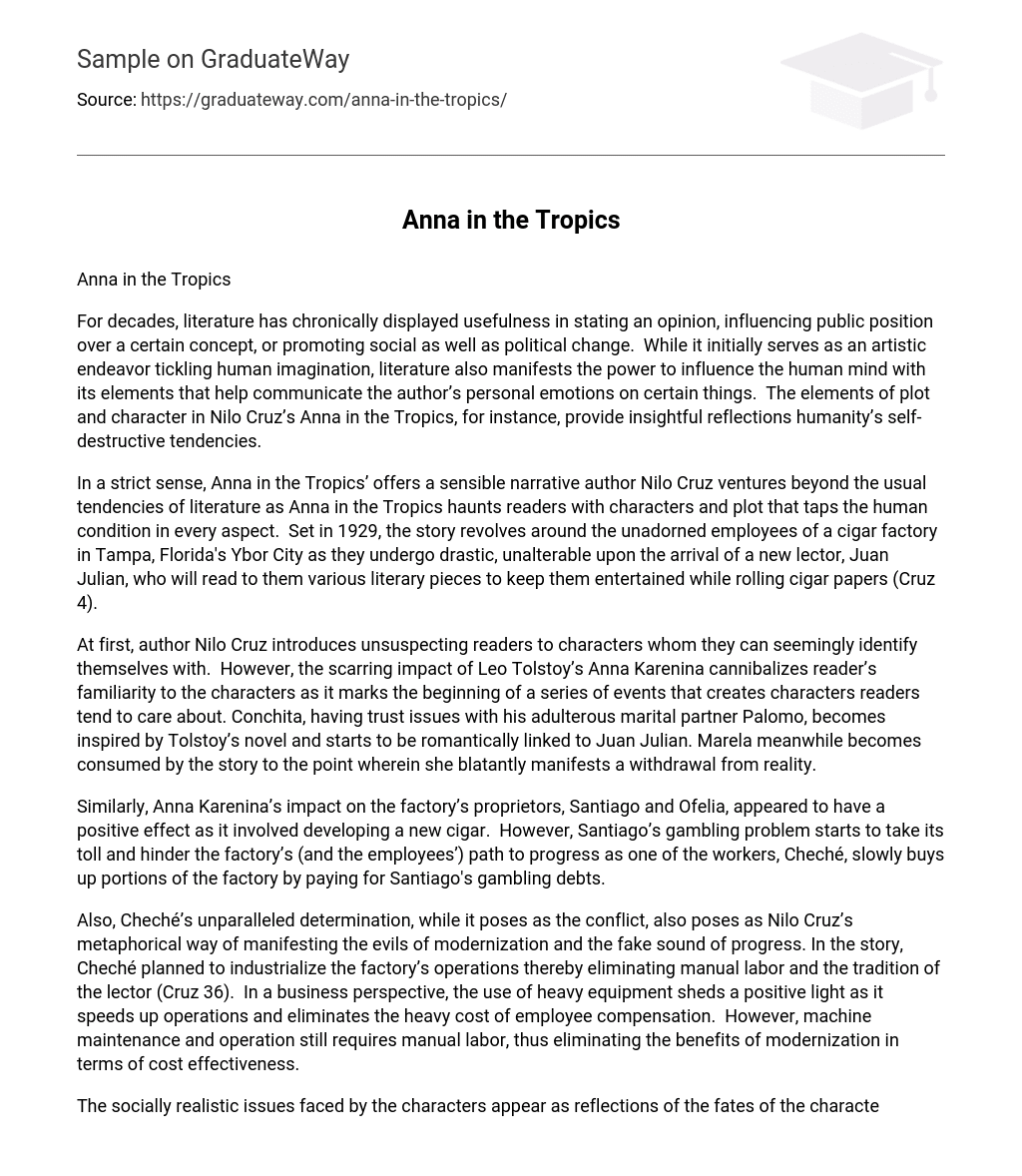For decades, literature has chronically displayed usefulness in stating an opinion, influencing public position over a certain concept, or promoting social as well as political change. While it initially serves as an artistic endeavor tickling human imagination, literature also manifests the power to influence the human mind with its elements that help communicate the author’s personal emotions on certain things. The elements of plot and character in Nilo Cruz’s Anna in the Tropics, for instance, provide insightful reflections humanity’s self-destructive tendencies.
In a strict sense, Anna in the Tropics’ offers a sensible narrative author Nilo Cruz ventures beyond the usual tendencies of literature as Anna in the Tropics haunts readers with characters and plot that taps the human condition in every aspect. Set in 1929, the story revolves around the unadorned employees of a cigar factory in Tampa, Florida’s Ybor City as they undergo drastic, unalterable upon the arrival of a new lector, Juan Julian, who will read to them various literary pieces to keep them entertained while rolling cigar papers (Cruz 4).
At first, author Nilo Cruz introduces unsuspecting readers to characters whom they can seemingly identify themselves with. However, the scarring impact of Leo Tolstoy’s Anna Karenina cannibalizes reader’s familiarity to the characters as it marks the beginning of a series of events that creates characters readers tend to care about. Conchita, having trust issues with his adulterous marital partner Palomo, becomes inspired by Tolstoy’s novel and starts to be romantically linked to Juan Julian. Marela meanwhile becomes consumed by the story to the point wherein she blatantly manifests a withdrawal from reality.
Similarly, Anna Karenina’s impact on the factory’s proprietors, Santiago and Ofelia, appeared to have a positive effect as it involved developing a new cigar. However, Santiago’s gambling problem starts to take its toll and hinder the factory’s (and the employees’) path to progress as one of the workers, Cheché, slowly buys up portions of the factory by paying for Santiago’s gambling debts.
Also, Cheché’s unparalleled determination, while it poses as the conflict, also poses as Nilo Cruz’s metaphorical way of manifesting the evils of modernization and the fake sound of progress. In the story, Cheché planned to industrialize the factory’s operations thereby eliminating manual labor and the tradition of the lector (Cruz 36). In a business perspective, the use of heavy equipment sheds a positive light as it speeds up operations and eliminates the heavy cost of employee compensation. However, machine maintenance and operation still requires manual labor, thus eliminating the benefits of modernization in terms of cost effectiveness.
The socially realistic issues faced by the characters appear as reflections of the fates of the characters in Tolstoy’s novel, using several spoken passages to emphasize the events in Anna in the Tropics’ characters. More importantly, the story tapped on the feelings of vengeance, failure, trauma, and hope. This allowed story’s simplistic characters to evolve into more engaging figures by making portraits of broader human emotion and condition.
In light of the unusual method of character development, Cruz could have developed character plots more originally. The unique issues that the characters possessed could have been a portal of well-developed ideas and storylines for each character. Marela, for instance, appears at one point in fully Anna Karenina clothing, which is unnecessary and does not have relevance in the entire narrative’s point of addressing social issues. Marela could have been used to create conflicts that would challenge the morality of the characters while challenging the readers’ moral judgment.
Works Cited
Cruz, Nilo. Anna in the Tropics. New York: Theatre Communications Group, 2003.





